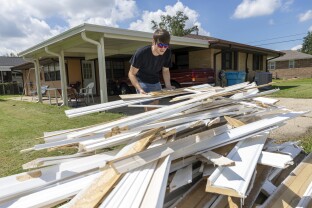Supporters of recent insurer-friendly laws in Louisiana say that allowing companies to drop customers will help drive down rates and keep people insured in the long run. But as California homeowners grapple with the implications of dropped insurance policies, some consumer advocates warn that Louisiana’s laws could be disastrous.
“When you give giant corporations more freedom to ruthlessly pursue profit, they do it and they don’t really think too hard about how this impacts individuals,” Peter Robins-Brown, the executive director of Louisiana Progress, said.
More than 20 insurance companies have fled Louisiana or gone under in the aftermath of worsening hurricanes since 2020. It’s driving homeowners’ costs up, causing people to go without insurance or be forced onto Louisiana Citizens, the state insurer of last resort, which is 10% more expensive than the market.
Rep. Troy Carter, a Democrat who represents New Orleans, told NOTUS that what’s happening in California with insurance is “what we’ve been dealing with for a very long time.”
In response, state lawmakers made a gamble that they say could bring back insurers: They rolled back a three-year-old rule that prevented insurers from canceling a policy or raising the premium if it was at least three years old, which companies cited as a disincentive for operating there.
But consumer advocates and some lawmakers say that the problem of keeping high-risk areas insured isn’t something state legislatures can fix alone. They say a federal overhaul of home insurance is the only thing that will work — and without it, homeowners will be left to the mercy of increasingly steep premiums.
“Hopefully the pain and suffering that California is going through, the pain in south Louisiana and others have gone through, will push some of my colleagues off the bench to say we really have to do something,” Carter said.
Proponents argue that rolling back Louisiana’s rule against canceling policies was necessary in the long term. John Ford, deputy insurance commissioner for public affairs at the state Department of Insurance, said insurance companies frequently cited this rule as a disincentive to doing business in Louisiana. People would be offered a renewal, but at too high a price for them to afford, he said.
“And because there’s not many insurance companies that really want to write business here or come here, there’s no other options,” Ford said.
Now, new policies won’t be subject to the rule, and insurers can drop up to 5% of older policies per year (with a stipulation that the 5% can’t be all in one area).
Critics of the rollback fear it will continue to push up premiums, drive a wave of nonrenewals, and ultimately leave some homes in the state uninsurable.
“What it did, in my opinion, was to create a very unlevel playing field for the consumer,” said state Sen. Joseph Bouie, a Democrat who represents part of New Orleans and opposed repeal of the bar on canceling policies. “I personally didn’t support it, and I think it is a draconian policy and will not help a consumer.”
Bouie said the federal government should provide a national homeowners insurance program like it does for flood insurance. He said that is the only way to mitigate the effects of climate change on states all over the country.
“I don’t expect that there will be an ability or capacity for a state like ours to ever be able to negotiate or have insurance companies be fair where we won’t have to have some assistance from the federal government,” Bouie said.
Robins-Brown said a better policy approach must be national because insurance costs end up being national too.
“Each time an event of this type of magnitude, whether it’s a wildfire in California, hurricanes along the Gulf Coast, flooding, every time, one of those get sort of added into their modeling, it has these ripple effects,” Robins-Brown said. “At some point, if we’re going to keep a viable property insurance market in America, we need to reverse climate change and/or figure out some sort of national plan where we’re spreading the risk out.”
House Democrats, led by then-Rep. Adam Schiff, proposed creating a federal catastrophe reinsurance program within the Treasury Department last year, but it didn’t get any GOP support.
It’s not that Republicans don’t see homeowners insurance rates and coverage as a problem. Gov. Jeff Landry, a Republican, signed the bill package last year. And Republican Rep. Clay Higgins is pushing a bill to give tax incentives to insurance companies that write policies in disaster-prone areas like California, Florida and Louisiana.
“So we think we can fix it,” Higgins told NOTUS. “But I have to convince this town to embrace this sort of commonsense reform.”
—
Helen Huiskes is a NOTUS reporter and an Allbritton Journalism Institute fellow.
Sign in
Log into your free account with your email. Don’t have one?
Check your email for a one-time code.
We sent a 4-digit code to . Enter the pin to confirm your account.
New code will be available in 1:00
Let’s try this again.
We encountered an error with the passcode sent to . Please reenter your email.


